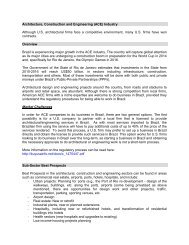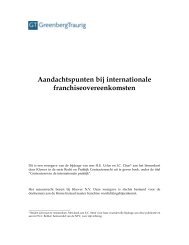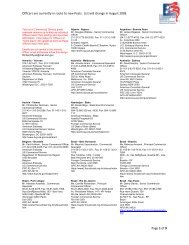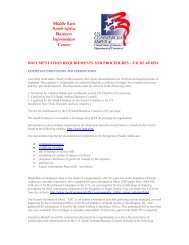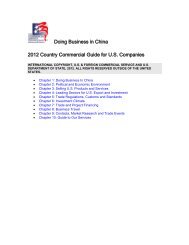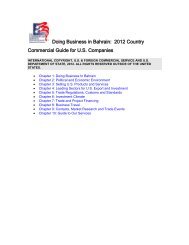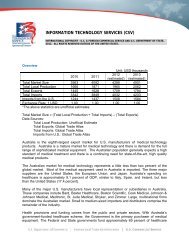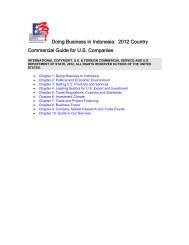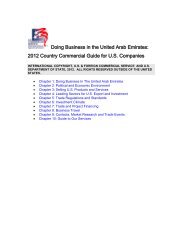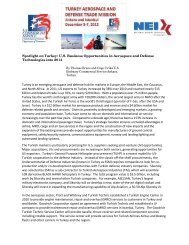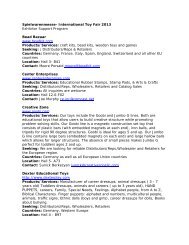The Chinese Men's Cosmetic Market: Guangzhou, Hong Kong and ...
The Chinese Men's Cosmetic Market: Guangzhou, Hong Kong and ...
The Chinese Men's Cosmetic Market: Guangzhou, Hong Kong and ...
Create successful ePaper yourself
Turn your PDF publications into a flip-book with our unique Google optimized e-Paper software.
15<br />
Intellectual property rights<br />
Since joining the World Trade Organization (WTO), China has followed the<br />
agreement to protect companies’ property. However, China has a large problem with<br />
counterfeit products entering the market. To protect a product properly, a company must<br />
register patents with China’s State Intellectual Property Office (http://www.sipo.gov.cn),<br />
<strong>and</strong> trademarks with the <strong>Chinese</strong> Trademark Office (found locally). Both systems are on<br />
a “first-file basis,” meaning the first to apply <strong>and</strong> provide evidence will receive the<br />
protection. Any party found guilty of violating laws related to intellectual property rights<br />
will be fined <strong>and</strong> may be further prosecuted depending on the severity of the violation<br />
(U.S. Department of Commerce International Trade Administration).<br />
Import controls<br />
<strong>The</strong> country has implemented import tariffs for all foreign cosmetics in<br />
accordance to the World Trade Organization st<strong>and</strong>ards. As previously stated, importing<br />
from <strong>Hong</strong> <strong>Kong</strong> is an exception to this st<strong>and</strong>ard regardless of the country of origin. As<br />
of 2009, tariffs were lowered to 6.5% with an additional 15% for hair/nail care products.<br />
Any color product automatically obtains up to an additional 10% to the initial tariff<br />
(Pisacane). After all requirements have been met for importing cosmetics, the prices<br />
could be up to 50% more than the initial value of the products. As of June 2011, in order<br />
to reduce this large price increase which will in turn promote more sales in China, the<br />
tariffs will be reduced to 2%-15% (Dayang). CCC Certification is only for use on<br />
electrical products. This will not apply to cosmetics.<br />
<strong>Chinese</strong> Politics<br />
<strong>The</strong> People Republic of China or the PRC was founded in part to establish a more<br />
stable government. From the PRC four different constitutions have been formulated that<br />
have been adapted by the PRC in 1954, 1975, 1978 <strong>and</strong> 1982. <strong>The</strong> constitution that is<br />
currently active was adopted in 1982, but was amended four different times <strong>and</strong> most<br />
recently on March 14, 2004. <strong>The</strong> legislation power lies within <strong>The</strong> National People’s<br />
Congress (NPC) <strong>and</strong> its St<strong>and</strong>ing Committee. <strong>The</strong> NPC <strong>and</strong> its St<strong>and</strong>ing Committee are<br />
responsible for representing the people <strong>and</strong> all of the levels that are part of the<br />
Congresses in China. <strong>The</strong> NPC supervises all state-level institutions. Its primary power,<br />
however, is electing the President of China. China is made up of 23 provinces, five<br />
autonomous regions, four municipalities directly under the Central Government, <strong>and</strong> the<br />
special administrative regions of <strong>Hong</strong> <strong>Kong</strong> <strong>and</strong> Macau. <strong>The</strong> 23 provinces are Anhui,<br />
Fujian, Gansu, Guangdong, Guizhou, Hainan, Hebei, Heilongjiang, Henan, Hubei,<br />
Hunan, Jiangsu, Jiangxi, Jilin, Liaoning, Qinghai, Shaanxi, Sh<strong>and</strong>ong, Shanxi, Sichuan,<br />
Taiwan, Yunnan, Zhejiang; the five autonomous regions are Guangxi, Inner Mongolia,<br />
Ningxia, Xinjiang <strong>and</strong> Tibet; the four municipalities are Beijing, Chongqing, Shanghai<br />
<strong>and</strong> Tianjin (Politics).<br />
<strong>The</strong> current head of state is President Hu Jintao, who was elected on March 15,





